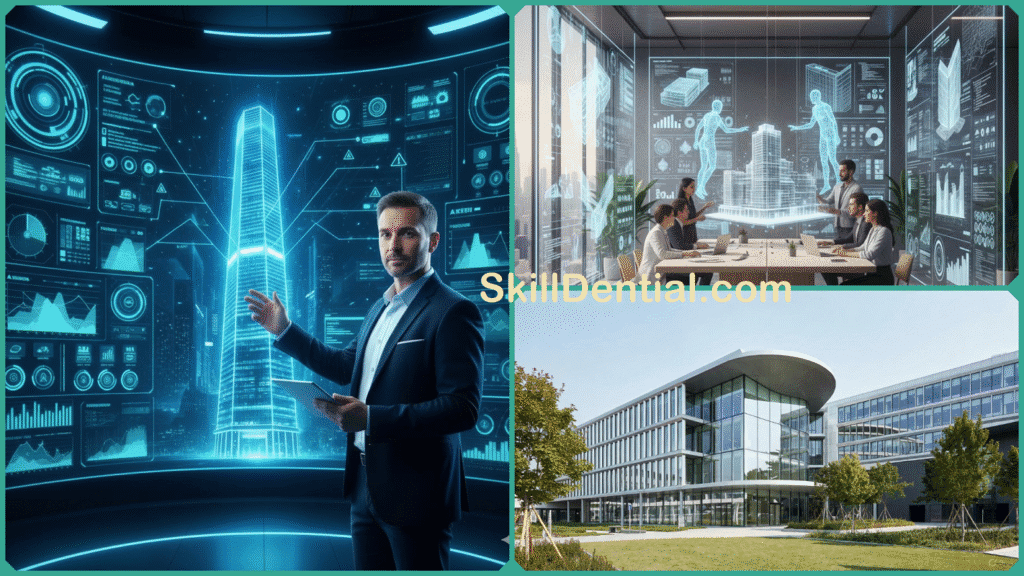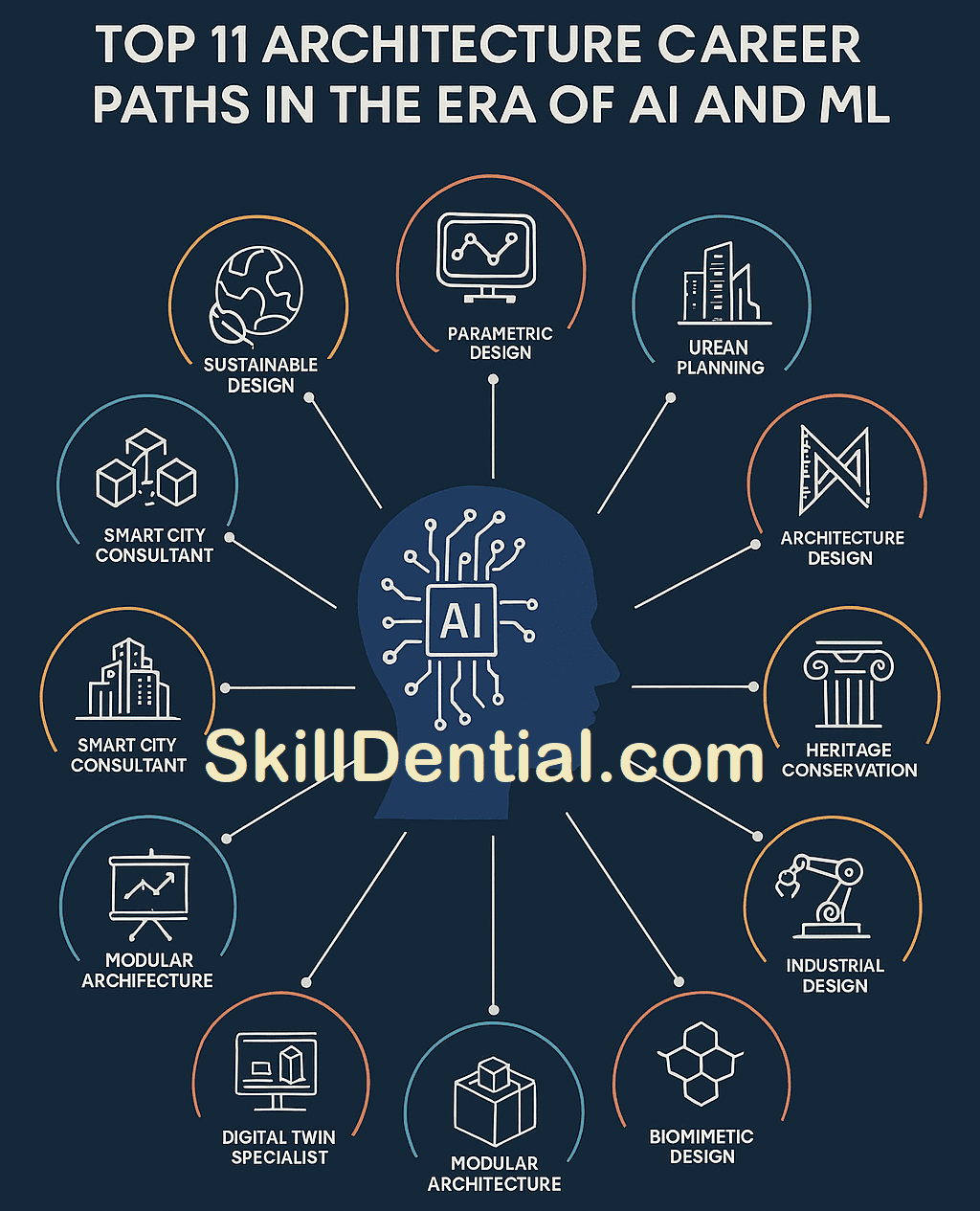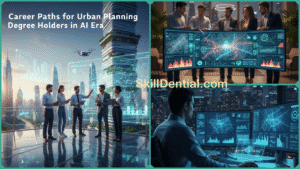Artificial intelligence (AI) and machine learning (ML) are revolutionizing traditional roles and creating a wide range of exciting new career opportunities in today’s fast-changing and rapidly evolving architecture industry. For architects and designers who want to future-proof their careers and stay relevant in this dynamic field, gaining a solid understanding of and actively embracing these cutting-edge technological advancements is essential.
The most promising and in-demand architecture career paths today combine creative design skills with advanced technical expertise in areas such as AI, computational design, data science, and automation technologies, offering a unique blend of innovation and artistry.

This post thoroughly explores the top 11 architecture career paths that are being significantly shaped and transformed by the advancements in AI and ML technologies. It provides a detailed overview of the essential skills required for each path, highlights emerging future trends in the industry, and offers valuable insights on how professionals at various experience levels can successfully adapt and thrive in this rapidly evolving landscape.
Introduction to AI and ML in Architecture Careers
AI and ML are increasingly integrated into architecture, reshaping workflows from conceptual design to construction management. Tools powered by generative AI accelerate design iteration and optimization, while ML-driven analytics enhance decision-making around sustainability and building performance.
This ongoing technological revolution presents a significant challenge for architects, requiring them to learn and master a wide range of new skills and tools. At the same time, it opens up unprecedented opportunities that allow architects to greatly enhance both their creative capabilities and overall efficiency in their work processes, pushing the boundaries of traditional design and construction methods.
The significance of understanding AI’s impact on architecture cannot be overstated. Mid-career architects often feel anxious about job security and relevance, architectural firm owners seek a competitive edge through strategic hires, and students must choose specializations aligned with future demand.
This comprehensive and detailed guide offers a wealth of actionable insights designed to educate readers thoroughly, alleviate common fears, and inspire meaningful career advancement opportunities within the rapidly evolving AI-era architecture landscape. It aims to provide valuable knowledge and practical advice to help professionals navigate the challenges and embrace the possibilities presented by artificial intelligence in the field of architecture.
Key Concepts Shaping AI-Driven Architecture Career Paths

Integrating AI with Building Information Modeling (BIM) is a foundational concept reshaping architecture careers by improving design efficiency, accuracy, and project management. AI algorithms enhance BIM’s capabilities through automated clash detection, real-time error identification, and resolution recommendations, greatly reducing rework and design conflicts.
This results in significantly higher model accuracy, a substantial reduction in construction errors, and much faster project completion timelines, all while effectively lowering overall costs. AI-powered BIM tools analyze historical and real-time data to forecast scheduling risks, cost overruns, and maintenance needs, enabling predictive planning and proactive problem-solving.
The integration also significantly enhances interdisciplinary collaboration by ensuring that all stakeholders consistently operate from the most current, thoroughly updated, and fully synchronized models. This approach greatly minimizes the risk of communication breakdowns and misunderstandings, thereby streamlining the entire workflow.
As a result, decision-making processes are accelerated and become more efficient, fostering a more cohesive and productive working environment across different disciplines. Generative AI within BIM automates design optimization by quickly producing multiple design options tested against structural, aesthetic, cost, and environmental criteria.
For example, AI-enabled projects have reduced design time by 50% and costs by 20%, while achieving sustainability certifications like LEED. AI analysis of energy usage and carbon footprints through BIM guides architects to greener, more efficient buildings.
Machine learning supports construction by predicting labor demand, material needs, and facility maintenance schedules, improving operational efficiency over a building’s lifecycle. Natural language processing automates document classification, further reducing manual tasks. These AI advancements allow architects to focus on innovation and creative input while routine tasks become automated.
Understanding BIM and AI integration is critical for architects aspiring to AI-driven roles or collaborating effectively with technology teams. Skills in BIM software (e.g., Revit), AI platforms, and data analysis are increasingly essential. The AI-BIM synergy enables smarter, faster, and more sustainable architectural design and construction practices, positioning architects at the forefront of the digital transformation in the industry.
This integration clearly exemplifies how artificial intelligence significantly enhances and supports architectural workflows instead of fully replacing human professionals, highlighting its importance as a crucial concept for effectively future-proofing architecture careers in the rapidly evolving AI era.
Top Architecture Career Paths in the AI and ML Era
The rapid rise and widespread adoption of Artificial Intelligence (AI) and Machine Learning (ML) technologies are not leading to the replacement of architects. Instead, these advanced tools are fundamentally transforming and reshaping the entire architecture industry in profound and innovative ways.
This shift is automating repetitive tasks (like drafting and code checking) and elevating the human role to a strategic one focused on data-driven decision-making, creative problem-solving, and managing complex AI-augmented workflows. To thrive, professionals must pivot and upskill.
Here are the Top 11 Architecture Career Paths that are rapidly emerging in the industry today, blending traditional design expertise seamlessly with essential AI technologies and advanced data fluency skills to effectively future-proof your career and keep you at the forefront of innovation.
Computational Architect
Specializes in designing advanced parametric and algorithmic models, focusing on automating complex design tasks through the use of scripting and computational methods. This role involves integrating computational techniques to enhance creativity and efficiency in architectural design processes.
- Required Skills: Proficiency in Python programming, experience with Grasshopper and Dynamo platforms, strong capabilities in 3D modeling, and advanced scripting skills to develop and implement automated design workflows.
AI/ML Impact: Significantly automates repetitive and time-consuming design tasks, allowing architects to rapidly generate highly complex and optimized models, thereby improving both productivity and innovation in the design process.
AI-Driven Sustainable Design Consultant
Uses advanced AI analytics to significantly enhance energy efficiency, optimize the use of various resources, and effectively reduce the carbon footprints of buildings. This approach integrates intelligent data analysis to drive smarter energy consumption and promote sustainable practices within building management systems.
- Required Skills: Proficiency in data analysis techniques, experience with sustainability modeling and the application of AI tools, as well as a strong knowledge of various environmental datasets and their interpretation.
AI and Machine Learning Impact: Significantly promotes environmentally friendly and sustainable design practices by leveraging advanced data-driven approaches. These technologies help architects and engineers create designs that are not only efficient but also align closely with green building certifications and standards, ensuring a reduced ecological footprint and enhanced energy performance.
BIM/AI Integration Specialist
Enhances BIM workflows by integrating advanced AI features designed to significantly improve collaboration among team members, increase accuracy in project details, and provide powerful predictive analytics for better decision-making throughout the entire construction process.
- Required Skills: Proficiency in BIM software such as Revit, extensive experience with AI platforms, expertise in API integration processes, and a strong understanding of cloud computing technologies and infrastructures.
AI/ML Impact: Significantly facilitates real-time updates to models, enabling faster and more accurate adjustments. It also automates clash detection processes, reducing manual effort and increasing efficiency. Additionally, AI/ML enhances risk prediction capabilities, allowing for better anticipation and mitigation of potential issues before they arise.
Machine Learning Architect
Builds and develops advanced machine learning infrastructure aimed at significantly optimizing both design and construction processes; oversees and manages the deployment of artificial intelligence solutions at a large scale to ensure efficiency and effectiveness across projects.
- Required Skills: Proficiency in machine learning algorithms, including a strong understanding of various ML techniques and their practical applications. Experience working with major cloud platforms such as AWS and Azure, demonstrating the ability to deploy and manage cloud-based solutions effectively. Familiarity with containerization technologies like Docker, along with orchestration tools such as Kubernetes, is required to support scalable and efficient deployment pipelines. Solid background in data engineering, encompassing data ingestion, transformation, and storage processes to ensure robust data infrastructure.
AI/ML Impact: Develops scalable and robust AI solutions that significantly enhance predictive capabilities, enabling more accurate and insightful forecasts. These advancements greatly improve operational efficiency across a wide range of applications and industries, driving innovation and delivering substantial value to businesses and organizations worldwide.
Generative Design Specialist
Develops innovative and unique design options by utilizing advanced generative AI algorithms combined with sophisticated parametric tools. This approach allows for the creation of novel design solutions that push the boundaries of conventional methods.
- Required Skills: Proficiency in AI generative platforms, advanced coding abilities, expertise in parametric design techniques, and strong knowledge of UX/UI principles specifically tailored for AI tools and applications.
AI/ML Impact: Significantly expands design creativity and innovation by enabling rapid, automated exploration of a wide range of possibilities, allowing designers to experiment with numerous ideas more efficiently and effectively than ever before.
AI-Enhanced Urban Planner
Uses advanced AI simulations to meticulously design sustainable and smart urban environments by leveraging comprehensive big data analytics. This approach integrates vast amounts of data to create innovative, efficient, and eco-friendly city planning solutions tailored to modern urban needs.
- Required Skills: Proficiency in AI simulation tools, advanced knowledge of Geographic Information Systems (GIS), expertise in urban data science methodologies, and strong collaborative planning abilities are essential for teamwork and project coordination.
AI and Machine Learning Impact: Significantly drives data-backed urban development strategies aimed at promoting efficient resource utilization and enhancing overall livability. These advanced technologies enable more informed decision-making processes by analyzing vast amounts of data, leading to smarter, more sustainable city planning and improved quality of life for residents.
Robotics and Automation Coordinator
Manages advanced AI-driven robotic construction technologies designed to automate and execute highly precise building tasks with exceptional accuracy and efficiency. Oversees the integration and operation of these cutting-edge systems to enhance construction processes and improve overall project outcomes.
- Required Skills: Extensive experience in robotics programming, advanced knowledge of AI control systems, and in-depth expertise in construction technology. These skills are essential for developing innovative solutions and managing complex projects effectively within the field.
AI/ML Impact: Artificial intelligence and machine learning technologies automate complex and labor-intensive processes, significantly increasing both the speed and the accuracy of operations. These advancements enable tasks that once required extensive human effort and time to be completed more efficiently and with fewer errors, ultimately enhancing overall productivity and effectiveness.
Digital Twin Manager
Develops highly detailed digital replicas of buildings and continuously monitors various systems within these structures to ensure optimal performance and efficiency. This process involves analyzing data to improve functionality and maintain peak operational standards.
- Required Skills: Expertise in Internet of Things (IoT) technologies, advanced AI analytics capabilities, proficiency with simulation software tools, and strong skills in managing real-time data streams efficiently and accurately.
AI and machine learning technologies significantly enhance the ability to continuously improve building maintenance processes and boost operational efficiency. By leveraging advanced algorithms and data analysis, these tools facilitate ongoing optimization, ensuring that maintenance activities are more effective and resources are utilized in the most efficient manner possible. This continuous improvement cycle, driven by AI/ML, leads to smarter decision-making and better overall building performance.
AI Workflow and Process Designer
Develops and implements AI-embedded operational workflows specifically designed to enhance and streamline the entire process of architectural design and project delivery. These innovative workflows integrate advanced artificial intelligence technologies to improve efficiency, accuracy, and collaboration throughout the architectural development stages.
- Required Skills: Strong expertise in workflow automation, in-depth knowledge of AI APIs, advanced process engineering capabilities, and excellent communication skills are essential. Candidates should demonstrate the ability to design and implement efficient automated workflows, integrate artificial intelligence APIs seamlessly, optimize complex processes, and communicate effectively with team members and stakeholders to ensure successful project outcomes.
AI/ML Impact: Significantly enhances productivity, improves quality, and ensures greater consistency throughout all phases of architecture project cycles, from initial design to final implementation.
AI-Powered Project Manager
Uses advanced AI tools to significantly improve the accuracy and efficiency of project scheduling, budgeting, risk management, and resource allocation. These intelligent systems help streamline complex processes, optimize resource use, and identify potential risks earlier, ensuring projects are completed on time and within budget.
- Required Skills: Proficiency in project management tools is essential to effectively coordinate tasks and timelines. A strong understanding of AI risk modeling is necessary to assess and mitigate potential issues related to artificial intelligence applications. Advanced data analysis skills are crucial for interpreting complex datasets and deriving meaningful insights. Additionally, excellent collaboration abilities are important to work seamlessly with diverse teams and stakeholders throughout the project lifecycle.
AI/ML Impact: Significantly enhances project delivery outcomes by providing robust data-driven decision support and greatly increasing overall efficiency throughout the project lifecycle.
AI Ethics and Data Governance Officer
Ensures the ethical use of artificial intelligence, safeguards data privacy, and maintains strict compliance with all relevant regulations and standards in the implementation of architectural AI systems. This commitment guarantees responsible AI deployment while protecting sensitive information throughout the entire process.
- Required Skills: A strong understanding of AI ethics principles, comprehensive knowledge of privacy laws and regulations, expertise in developing and implementing governance frameworks, and the ability to effectively coordinate across multiple interdisciplinary teams and stakeholders.
AI/ML Impact: Ensures the responsible and ethical integration of artificial intelligence and machine learning technologies by implementing robust safeguards that uphold the integrity of systems and foster ongoing public trust and confidence.
In Summary
Each of these roles blends architectural fundamentals with AI/ML technical skills and soft competencies such as cross-disciplinary collaboration and ethical awareness. Professionals developing expertise in Python, AI platforms, BIM, cloud computing, generative design, and AI governance are well-positioned for these emerging career paths in architecture.
Firms must encourage upskilling and strategic hiring to stay competitive, while architects and students should focus their education and training on AI competencies to future-proof their careers. Emerging market data signals strong demand and lucrative salaries for AI-savvy architecture professionals, confirming AI as a transformative force that augments rather than replaces architectural expertise.
By actively embracing and pursuing these 11 diverse career paths, the architecture industry has the incredible opportunity to fully harness and unlock AI’s vast potential. This will enable professionals to drive innovative, sustainable, and highly efficient design and construction practices that can transform the built environment for the better.
Summary of Top Architecture Career Paths in the AI and ML Era
| Career Path | Description | Required Skills | AI/ML Impact Highlights |
|---|---|---|---|
| Computational Architect | Designs parametric and algorithmic models using scripts and software to automate designs. | Proficiency in Python, Grasshopper, and Dynamo; knowledge of scripting and 3D modeling tools. | Automates repetitive tasks and enables complex designs. |
| AI-Driven Sustainable Design Consultant | Uses AI analytics for energy efficiency, resource use optimization, and carbon footprint reduction. | Data analysis, AI tools for sustainability modelling, and knowledge of environmental data sets. | Drives data-driven, eco-friendly design strategies. |
| BIM/AI Integration Specialist | Integrates AI-enhanced capabilities into BIM workflows, improving collaboration and accuracy. | BIM software (Revit), AI platforms, knowledge of API integrations, and cloud computing. | Enables predictive analytics and real-time model updates. |
| Machine Learning Architect | Develops ML infrastructure for design optimization and construction analysis. | ML algorithms, AWS/Azure cloud, Docker, Kubernetes, data engineering. | Ensures scalable AI model deployment in architecture firms. |
| Generative Design Specialist | Focused on creating novel design options powered by generative AI algorithms. | AI generative tools, coding, parametric design, and UX/UI design for AI tools. | Expands creative possibilities rapidly. |
| AI-Enhanced Urban Planner | Uses AI to simulate and plan smarter, sustainable urban environments. | AI simulation tools, GIS, urban data science, and stakeholder collaboration skills. | Supports data-driven urban development strategies. |
| Robotics and Automation Coordinator | Implements robotic construction technologies controlled by AI for precision building. | Robotics programming, AI control systems, and construction tech knowledge. | Automates complex, labor-intensive construction activities. |
| Digital Twin Manager | Creates and manages digital replicas of buildings for monitoring and optimization. | IoT, AI analytics, simulation software, and real-time data management. | Improves building performance and maintenance. |
| AI Workflow and Process Designer | Designs workflows embedding AI at every phase to enhance productivity and quality. | Workflow automation, AI APIs, process engineering, stakeholder communication. | Streamlines architectural design and delivery pipelines. |
| AI-Powered Project Manager | Leverages AI tools for scheduling, budgeting, risk analysis, and resource allocation. | Project management software, AI risk modeling, data analysis, and soft collaboration skills. | Increases project efficiency and cost control. |
| AI Ethics and Data Governance Officer | Ensures ethical AI implementation and compliance in architectural AI systems. | Knowledge of AI ethics, data privacy laws, governance frameworks, and interdisciplinary coordination. | Protects integrity and transparency in AI-based practices. |
This comprehensive guide is thoughtfully designed to educate and inform mid-career architects, firm leaders, students, and individuals considering a career change about the rapidly evolving opportunities and essential skills required within the exciting field of AI-powered architecture in 2025 and the years that follow.
Its primary goal is to offer comprehensive and valuable insights into the numerous ways artificial intelligence is revolutionizing architectural practices, fundamentally changing the field. Additionally, it focuses on what professionals in the industry need to understand and keep up with to remain competitive and successful in this rapidly evolving and dynamic sector.
Emerging Industry Trends and Skills Forecast
Architectural firms across the industry are rapidly adapting to the ongoing AI revolution by actively hiring specialists with expertise in AI integration, computational design, and other advanced related technologies in order to maintain a competitive edge in the marketplace.
This significant shift clearly reflects an industry-wide recognition that the future of architectural practice fundamentally depends on mastering AI and machine learning tools, which must be effectively complemented by a strong foundation in traditional design knowledge and principles. Essential skills such as:
- Python programming
- A thorough understanding of various machine learning models
- Ability to collaborate effectively with AI specialists
They are progressively transforming into fundamental baseline competencies that every modern architect must not only develop but also continuously refine and possess to achieve success and thrive in this rapidly evolving and dynamic professional landscape.
AI is not displacing architects; instead, it serves as a powerful enabler that significantly amplifies their creative and analytical capabilities. Generative design tools, for example, greatly accelerate the ideation phase by automatically exploring a wide range of design alternatives based on clearly specified constraints, thereby saving valuable time and pushing the boundaries of innovation further than ever before.
Additionally, machine learning enhances the accuracy of building performance simulations and predictive maintenance processes, allowing architects to design buildings that are not only more sustainable but also far more efficient in their operation and long-term functionality.
As automation increasingly handles routine, repetitive tasks—such as drafting, compliance checks, and clash detection—architects are free to focus on strategic decisions, creative problem solving, and stakeholder engagement. Success in this evolving environment requires continuous learning and cross-disciplinary teamwork combining design, data science, and AI ethics.
To future-proof careers in architecture, professionals should prioritize developing:
- Programming skills, especially Python and visual scripting tools like Grasshopper
- Familiarity with cloud-based AI platforms such as Amazon Web Services (AWS) and Microsoft Azure
- Data literacy, including the ethical and transparent use of AI and big data
- Advanced computational design and generative design proficiencies
- Soft skills for effective cross-functional teams and communication
Additionally, knowledge of AI-enhanced BIM systems and robotics in construction is increasingly important, as these technologies streamline project workflows and enable precision building automation. Architect roles integrating these skills promise greater job security and influence amid the digital transformation.
Architects who actively embrace and integrate these emerging trends will successfully position themselves and their firms at the cutting edge of innovation, sustainability, and operational efficiency within the rapidly evolving, AI-driven era of architecture. By doing so, they will not only stay ahead of the competition but also contribute significantly to shaping the future landscape of architectural design and practice.
FAQs
Will AI replace architects?
AI is designed to augment and enhance architects’ capabilities, not to replace them. It automates routine, repetitive tasks such as documentation, compliance checks, and early-stage design iterations, freeing architects to focus on creativity, strategic thinking, and innovative problem-solving.
What programming languages should architects learn?
Python is the most recommended programming language for architects interested in AI and ML due to its extensive AI/ML libraries and community support. Additionally, visual scripting tools like Grasshopper for Rhino are crucial for computational design and parametric modeling workflows.
How can mid-career architects adapt to AI changes?
Mid-career architects can adapt through continuous upskilling with AI-related online courses and certifications, learning computational and generative design methods, collaborating closely with AI and data specialists, and integrating AI-enhanced tools into their daily workflows to increase productivity and innovation.
What role does AI ethics play in architecture?
AI ethics is critically important as architects use AI for design and decision-making. Ethical AI use ensures fairness, privacy, transparency, and accountability of AI systems. Data governance frameworks help maintain trust in AI outputs and safeguard against bias or misuse, which is essential in broad societal impacts and regulatory compliance.
Are there certifications for AI-related architecture skills?
Certifications related to BIM, data analytics, machine learning, AI ethics, and project management are increasingly relevant and valuable for architects. These credentials demonstrate proficiency in integrating AI into architectural practice and enhance career prospects in the rapidly transforming industry.
In Conclusion
AI will not erase the architecture profession; rather, it will significantly amplify the value of those professionals who actively choose to adapt and evolve alongside these technological advancements. The most resilient and sustainable “architecture career path” in this rapidly advancing AI and machine learning era is not simply defined by a single job title or role.
Instead, it is best understood as a dynamic mindset—one that skillfully combines traditional design intuition with the power of data, coding expertise, and a strong ethical framework to tackle complex, higher-order problems that algorithms alone are incapable of addressing effectively.
Architects who actively embrace Python programming and become proficient with Grasshopper, while also learning to effectively collaborate with advanced AI tools, and gaining a deep understanding of Building Information Modeling (BIM), cloud computing platforms, and robotics technologies, will successfully transition from simply being draft producers to becoming influential strategy leaders within their architectural firms and the cities they help design and shape.
Rather than asking, “Will AI replace architects?”, the better question is, “How quickly can architects step into these 11 emerging roles and lead this transformation?”
Those individuals who begin the process of re-skilling today will play a crucial role in shaping the next generation of sustainable, intelligent, and human-centered spaces. By embracing new skills and knowledge now, they will not only contribute to creating environments that are more eco-friendly and technologically advanced but also develop careers that are significantly more future-proof, influential, and deeply rewarding than ever before. This proactive approach to learning ensures they remain at the forefront of industry innovation and leadership.
Discover more from SkillDential
Subscribe to get the latest posts sent to your email.


